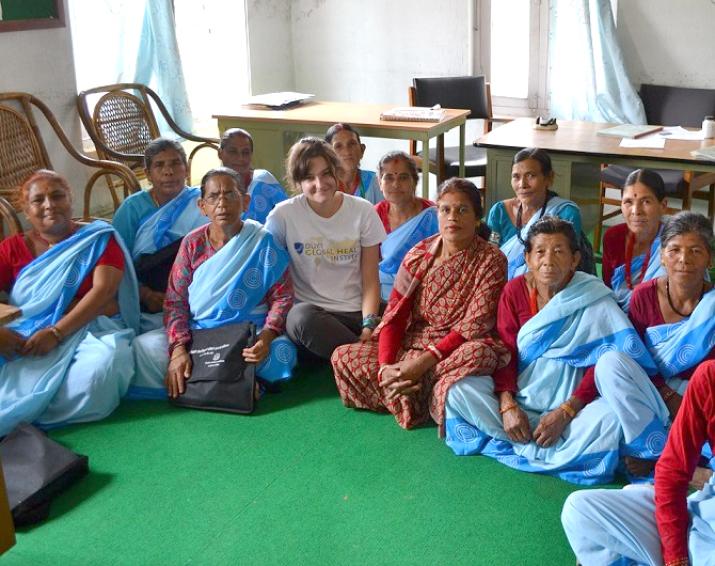By Anastasia Lambrou
Global Health Program II major
This essay is a winner in the Duke School of Nursing’s Global Health Essay Contest.
I need 50,000 umbrellas as soon as possible. Yes, umbrellas: those handy apparatuses that protect us from the rain. However, they are much more than that. Umbrellas can be used to ameliorate heath disparities throughout the country of Nepal.
This past summer, I traveled to Nepal to embark on my Independent DukeEngage Project and Duke Global Health Institute Student Fieldwork. I volunteered at an HIV/AIDS home for children and their mothers and in the afternoons I conducted research on Nepal’s healthcare system. I conducted interviews and got an inside view of the health of Nepal’s people.
My research ended up focusing on understanding Nepal’s FCHV Program. FCHV stands for Female Community Health Volunteer, who are trained by the Nepalese Ministry of Health to provide a grassroots level of healthcare. They do not receive any monetary compensation from the government and are considered the backbone that holds Nepal’s healthcare system together. These women are chosen by local leaders and mothers to serve their community. Consequently, the FCHVs are respected and revered by the community and are able to be catalysts for positive health change.
The FCHVs help with vitamin A supplementation, deworming, first aid, nutrition, family planning, infectious diseases, reproductive health, family counseling, and the National Immunization Program. They have reduced Nepal’s mortality rate by advocating prenatal care and hospital births. FCHVs have been trained to tackle childhood diarrhea, the greatest killer of children in Nepal. They FCHVs promote gender equality in their communities. Nepal is ridden with health disparities, and the FCHVs attack these disparities with their tireless work and dedication.
I interviewed FCHVs while on a field excursion with the WHO’s Division of Immunizations and Preventable Diseases. The sea of blue saris adorned with the circular FCHV logos was unforgettable. I gained a deeper awareness of the challenges of their work. The women feel abandoned by the government. They want more than just their sari and minimal health supplies. I asked, “If you were provided with any resource to make your job easier, what would it be?” A unanimous answer came back. My interpreter, translated, “Umbrellas.” I was flabbergasted by their answer. The women wanted umbrellas to protect them from the monsoon, sun, and to serve as a safeguard.
This answer inspired me. These women hold Nepal’s healthcare system together. Thus, I am creating “Project Umbrella”. I am going to provide 50,000 FCHVs with umbrellas carrying their logo. I have gotten approval from the Nepalese government and the WHO has agreed to assist with distribution. All I need now are the umbrellas. The umbrellas will distinguish the women in their communities and be a symbol of respect. The umbrellas will also serve as an incentive for FCHVs to continue their work. It will be a strong source of empowerment and confidence.
In the future, I would like to create further programs supporting the FCHVs. An annual FCHV conference could gather FCHV representatives from each district to collaborate and share their experiences. My dream career would be an infectious disease physician working for the WHO in Asia, while also running beneficial heath NGOs in Asia’s developing countries starting with Nepal.



